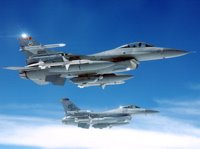Si Vis Pacem, Para Bellum
Sunday, June 18, 2006
Monday, June 12, 2006
Wednesday, June 07, 2006
Am Yisrael Chai
It was 25 years ago this very day-- Simple Minds, Mandela Day
Now freedom moves in closer every day
Twenty-five years ago, on Sunday, June 7th, 1981, Israel set out to do what many deemed impossible, what some thought to be unnecessary at best, foolish at worst, and what we know was essential and elementary for the survival of the Jewish People. The Israel Air Force (Heyl Ha'Avir), using the unparalleled and unsurpassable symbiosis of Israel ingenuity and American weaponry, destroyed the Iraqi Al-Tuwaitha nuclear reactor at Osirak. Saddam, one of the Twentieth Century's worst dictators, had planned to use this site to manufacture the weapons to complete Hitler's work in a Final Solution of his own.
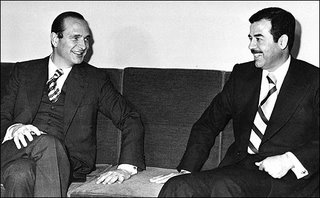 It would not have been possible without amoral, anti-semitic and delusional Western politicians, with the vile and contemptible Jacques Chirac paramount among them. Chirac was no ordinary French politician, though his delusions of grandeur, his corruption and his atavistic hesperophobia, articulated into a profound hatred of America and Israel, were more developed examples of a general strain of French thought (or, more appropriately, French non-thought).
It would not have been possible without amoral, anti-semitic and delusional Western politicians, with the vile and contemptible Jacques Chirac paramount among them. Chirac was no ordinary French politician, though his delusions of grandeur, his corruption and his atavistic hesperophobia, articulated into a profound hatred of America and Israel, were more developed examples of a general strain of French thought (or, more appropriately, French non-thought).There was simply nothing Chirac would not do for money, power, or French "glory" - and he was one of the main architects of a French role in the Middle East that wrecked every party involved, and that was only a close second to the Soviet Union in the harm and destruction it entailed. Grandeur indeed.
Israel knew what to expect from France, and Prime Minister Menachem Begin, the sole member of his entire family to survive the Holocaust, knew what to expect from the world in general. There were actions Israel could take, such as sabotaging the French shipments to Iraq, proceeding with targeted killings of Iraqi scientists, or trying to influence at least some of its allies. But that only did so much, and more radical steps were called for.
Enter the Heyl Ha'Avir .
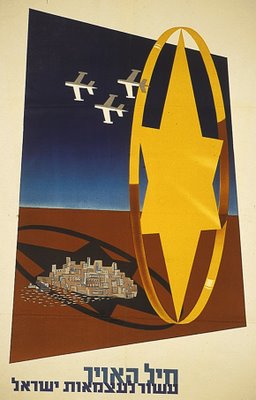 Widely considered to be the best non-strategic Air Force in the world, it had never undertaken a long-range bombing mission. Ever since the early morning of June 4th, 1967, and Operation Focus , the destruction of 97% of the Egyptian Air Force on the ground, its audacity, courage, focus and determination made it the envy of its Allies, and the greatest fear of its enemies (as well it should).
Widely considered to be the best non-strategic Air Force in the world, it had never undertaken a long-range bombing mission. Ever since the early morning of June 4th, 1967, and Operation Focus , the destruction of 97% of the Egyptian Air Force on the ground, its audacity, courage, focus and determination made it the envy of its Allies, and the greatest fear of its enemies (as well it should).Ezer Weizman, the architect of the IAF, had built a remarkable organization that routinely broke new records, and that never, ever tired in its relentless pursuit of perfection. Few doubted that the IAF could achieve anything that Israel's political leadership would demand of it.
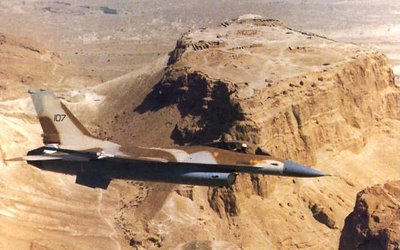 The IAF had always been included in the various scenarios for a targeted strike of Saddam's equivalent to Zyklon B, yet it lacked a suitable plane, until the F-16, one of the best fighter jets of all time, was delivered in 1980 (ironically, as part of a batch of airplanes that was originally intended for the Shah's Iran). This changed the game, and it was to change the course of world history.
The IAF had always been included in the various scenarios for a targeted strike of Saddam's equivalent to Zyklon B, yet it lacked a suitable plane, until the F-16, one of the best fighter jets of all time, was delivered in 1980 (ironically, as part of a batch of airplanes that was originally intended for the Shah's Iran). This changed the game, and it was to change the course of world history.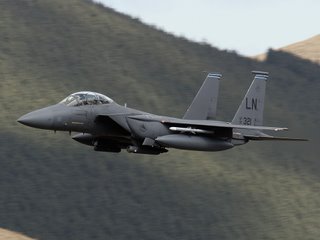 The eight F-16 pilots managed to destroy the Osirak plant beyond repair, and they did so without losing a single plane or pilot. The fighter escort, composed of eight F-15 - widely considered to be the best fighter airplane in the world, and in service with only four Air Forces - was not even needed, and the sixteen planes raced home to Israel undisturbed, secure in the knowledge that they had achieved something great, something lasting, and something noble.
The eight F-16 pilots managed to destroy the Osirak plant beyond repair, and they did so without losing a single plane or pilot. The fighter escort, composed of eight F-15 - widely considered to be the best fighter airplane in the world, and in service with only four Air Forces - was not even needed, and the sixteen planes raced home to Israel undisturbed, secure in the knowledge that they had achieved something great, something lasting, and something noble.The youngest of the F-16 pilots, Ilan Ramon, the son of a Holocaust survivor from Romania, would go on to become Israel's first astronaut, forever reminding us that for Israel, the Jewish people, and the world, no dream is too big, no goal too high, and no burden too heavy.
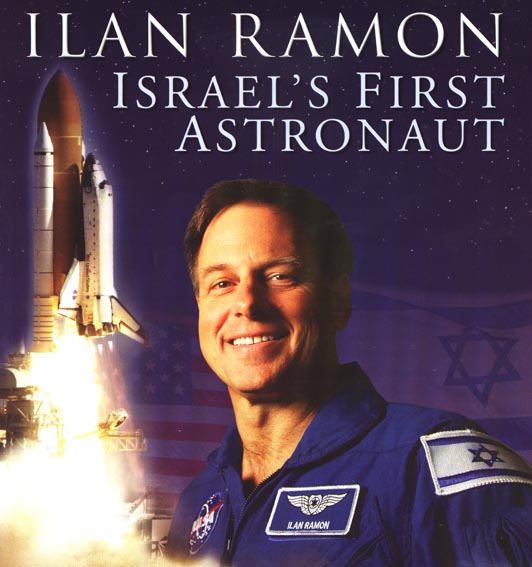
May God Bless Israel.
Tuesday, June 06, 2006
D-Day, 62 years on
Les sanglots longs des violons de l'automne
bercent mon cœur d'une langueur monotone
These lines, from Verlaine's Chanson d'automne, were the signal that marked the beginning of the most ambitious military operation in the History of mankind, launched in the early morning of June 6th, 1944, led by the United States, Great Britain and Canada.
This was to be the most consequential day of the Twentieth Century, a day that would decide on History's further course, and it was, in many ways, the decisive battle for Freedom, and the survival of mankind in a meaningful way.
Freedom survived. And America made the world a much, much better place, something for which America deserves our eternal gratitude.
God Bless America.
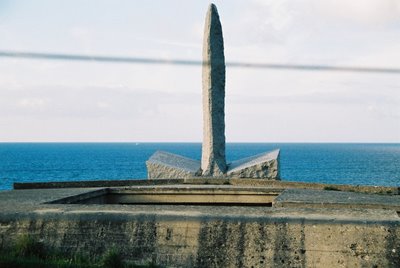

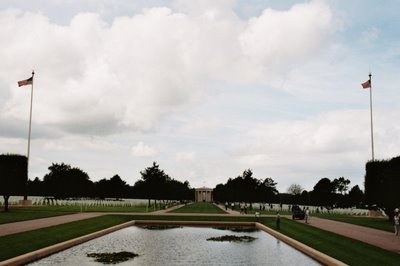
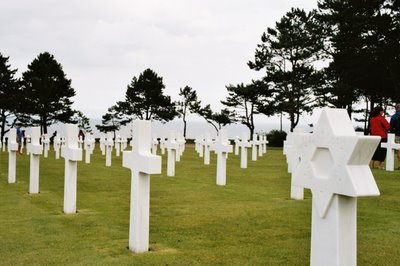
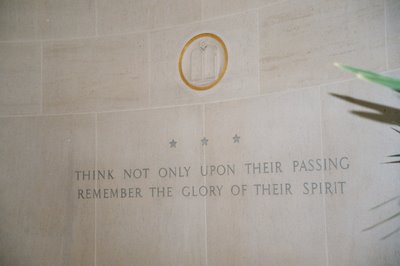

Friday, June 02, 2006
A worthy Friend, a true Ally, and an Inspiration - Why Turkey belongs in the EU
The case for Turkey's entry into the EU, and for its continued role in the Western world, could be made just by ripping apart its enemies' arguments. For example, a large part of the anti-Turkish animosity is influenced and put forward by Greece and its allies, whose grievance against all things Turkish are as central to their existence as the general hatred against all things Western. I will address these concerns in due time, but I would like to begin with a synecdochical overview of Turkey and the world, with Turkey's friends and enemies, and its enviable role as the "healthy man" of the Muslim Ummah.
I happen to believe that, if one were to set up a shortlist of Muslim-majority countries in which a Western lifestyle would be possible, Turkey would be at or near the top in all cases.
Few will doubt, and fewer still will criticize, Turkey's importance in the twenty-first century. Its direction will in all likelihood make a significant contribution to the civilized world's survival - or downfall - there seems to be, in my opinion, a lack of genuine discussion of how this development can be influenced. The same goes for the eventual result of said development - where will Turkey stand, whose side will it stand by, and how will it fit into the twenty-first century's global security and economy? What, furthermore, is at stake, and what do Turkey's allies and neighbors stand to gain by pushing it in the right direction?
The premise of this article is that Turkey is a worthy member of the European Union, one of the West's best hopes in our war against Radical Islam, Israel's only reliable and strategic regional ally, and an inspiration to the entire Muslim Ummah. No other country holds the potential of being a beacon of modernity and moderation for Muslim countries from Morocco to Malaysia.
As an aside, I do not like, and shall refrain from using, the epithet "Islamic" when dealing with states such as Morocco, Jordan or Malaysia, since this definition is far more suitable for the twin pillars of Radical Islam, the Islamic Republic of Iran and the Kingdom of Saudi Arabia. I also prefer the term Radical Islam to the alternatives of Islamo-Fascism, Political Islam or even Islamism.
On the surface, the strongholds of Radical Islam, and their offshoots, tend to be concentrated around the Arab center of the Muslim World, in the direct sphere of influence of a powerful, aggressive Islamic state, which is generally looking for a way to export its fantasies. This is true for the centers of Sunni extremism of Saudi Arabia and Egypt vis-à-vis Algeria, and for Pakistan vis-à-vis the Afghanistan of the Taliban.
Turkey, however, situated at the crossroads of Europe and Asia, sitting astride the strategically invaluable Canakkale (the Dardanelles), has generally resisted to the temptations of these and other ills that have plagued the Muslim world in the past few decades. Admittedly, these ills - nationalism, Soviet-bankrolled communism, French-financed Pan-Arab hesperophobia, and Shia extremism - did not, generally, affect the non-Arab Muslim world as much as they did the core Arab countries, Iran being as tragic and glaring an exception as any (one which I shall dwell on in much more detail at a later point in time).
At the risk of defining the civilizational standard downwards, here is a list of what Turkey has done without since its founding:
- Violent military coups
- Wars of aggression against sovereign countries
- Killing of minorities or opposition groups
- Radical Socialism
- Fascist-inspired dictatorship
- Civil War
- War against a Western country
- Radical Islamic repression
- War against, low-intensity conflict with, or even boycott of Israel.
This may not be much. But it is not nothing, either. And, to dwell a bit further into History, it is worth noting that the Turks and the Jews never fought against each other, but both have fought against Arabs. While the precursors to today's Arab regimes - professed moderates and others - were tacitly or explicitly allied with Nazi Germany, supporting and encouraging crimes against humanity that defined the term, Turkey accepted more refugees than any other continental European nation. Quite unlike all (yes, all) of the EU nations of Continental Europe, Turkey did not undergo a change of the system of government in the past seventy-five years. Turkey also recognized Israel before a number of European states did so. In fact, it did so no less than sixteen years before the Federal Republic of Germany did so.
Think about that, for a minute: a country with a majority of Muslims recognizes Israel in 1949, right after the end of the latter's War of Independence. Germany, on the other hand, recognizes the right of the survivors of the Holocaust, the worst crime in mankind's long, dark history - a crime enabled by Austrians, Poles, Dutchmen, Lithuanians, Hungarians, Romanians, Slovakians and others, but imagined, created and implemented by Germans - a full sixteen years after the end of said war, and no less than twenty years after these survivors had been liberated from the Death Camps.
This, to me, should be enough to exclude Germany from any discussions about Turkey's accession to the European Union for reasons of "civilization" or "modernity".
I can accept the opinion of France on Turkey. And that of the United Kingdom. Obviously. Holland, certainly. Italy, definitely. Even Spain, possibly. Maybe, in a stretch, even Greece (with the aforementioned caveats).
But Germany? Never.
Not being in thrall to Arab and Radical Islamic impulses, Turkey's part, geostrategically speaking, has been that of securing NATO's southeastern flank - a task it has fulfilled to an admirable extent, well worthy of a founding member of this august organization. Turkey has also consistently scored as one of the most free of all Muslim states - faint praise, maybe, but praise nonetheless. And beyond Turkey's instrumental role in the Cold War, the war for Kuwait, and the ensuing patrolling of the No-Fly Zones from 1991 to 2003, would simply not have been possible without Turkey, and the ideally positioned Incirlik Air Base.
Among the opponents of Turkey's entry to the European Union, much has been said about the "backward" character of Turkey. Yet when confronted with the fact that, apart from Mustafa Kemal's Atatuerk's oeuvre, George Washington was the only other General who founded a democracy, a worrying number of critics question Turkey's democratic bona fides. Some of these critics point to the Islamic Party's election victory in 2002. Yet I fail to see why this victory, in the framework of a republic that respects Human Rights, the rule of Law and Property Rights, needs to be a bad thing. In fact, the Islamists' victory - occurring, as it did, against the explicit wishes of the Turkish Army, the guardian of Republican values and secularism - proved that Turkish democracy is working, and I remain confident that the Islamists will not have the answers to the problems of a complex and modern government, leading me to anticipate their loss in the next elections.
Of course, some will say that power still rests not with the government, but with the army. Hilmel Özkok, the Chief of Staff of the Turkish Army, Navy and Air Force, might be surprised to learn that he is supposed the be the most powerful man in the country, but it is without a doubt true that the Armed Forces will have to compromise with the Islamists' government, just as the government will have to strive for compromise with the Armed Forces. Why this should be a bad thing is beyond me.
The role of the Armed Forces, it has been said, is too important for Turkey ever to be a true member of Europe. There may be a modicum of truth in this assertion, and yet, this power, constitutionally protected as it is, has also ensured Turkey's secularity - one of the most remarkable success stories of the past several decades. The only other country in Europe with as strict a separation of church/mosque and state is Turkey. The remainder of the EU need not complain - not, that is, until mandatory tax withholdings on citizens' income is outlawed in Germany, Austria, and several other states.
One key element that no anti-Turkey crusader has addressed - certainly not to my intellectual satisfaction - is the issue of the alternatives that would remain for Turkey. Turkey might look eastwards, or southwards (how do you say Muslim Brotherhood or "Itbach al-yahud" in Turkish?). And that might be it.
But more is at stake here than one country, however important. How, after all, is the West to claim, with a straight face, that efforts to move towards the Western civilizational ideal will be encouraged and rewarded, if the most Western and most civilized country in the Muslim world, a country that has been part of the West pre-eminent security alliance for almost sixty years, and a trustworthy ally of Israel and America, were to be rejected and shown to be an outcast?
How could one possibly convince Iraq, or Malaysia, or Morocco, not to mention Iran or Sudan, to embrace the West?
How, indeed?
Now, these critics will argue, Turkey may not be an Islamic country, but it would be the first EU member with a majority of Muslims. And the same critics will argue that Islam and democracy are mutually exclusive, that no Muslim country has a "right" to be a part of the European Union.
So be it.
But what, I wonder, do these critics make of the following points:
1. The EU's growing, if not total, atheist outlook and essence
2. The growing Muslim majorities in most, if not all, EU member countries.
Let us presume, just for the sake of the argument, that these critics are right.
Why, then, is a non-Christian entity - or, more to the point, what I would call a post-Christian, or post-religious - entity like the EU worried about Turkish Muslims in a prospective member - but not, apparently, about its own disenfranchised, radicalized, and oftentimes anti-Western Muslim immigrant communities?
Does anyone believe that the Turks of Istanbul, Ankara or Izmir are, for some reason, less inclined to adapt to the Twenty-First Century than the Arabs of Lyon, Madrid or Copenhagen are?
If so, why exactly?
And, on the same level - what to make of said conclusion?
There are a number of other arguments that would seem to point in favor of Turkish membership, from a higher level of economic competition to the obvious military benefits (apart from the Royal Air Force and Royal Navy, no European Armed Forces are a match for Turkey - decades of joint training with the world's best Armies, Navies and Air Force do not go without results), but these will be the subject of a later piece.
In closing, I should add that, in the past few years, Turkey has also come to play a more decisive diplomatic role, and its willingness and ability to support Western interests and to enhance Israel's standing in the world.
The EU's standing in the world could hardly be worse - a sclerotic union of dying first-world has-beens and ragtag geographical accidents, it has far outlived its raison d'être, and the "shared values" are none that Turkey, or any other forward-looking country, would do well to emulate.
One could make the case that Turkey's membership could break up the EU and force it to become leaner, looser and more focused - on the single market, on economic reforms, and the like. The competition of Turkey's far lower labor costs, combined with a young and growing population, would certainly make for an interesting amount of internal tension. Turkey is, in this view, the anti-EUrocracy - a justification in itself.
Thus, the road to a twenty-first century Brussels runs through Ankara.
Also, NATO membership is, if not more important, certainly more select - and arguably more costly and more risky - than EU membership. Turkey has stood its ground, on the frontlines of the Cold War, the first Gulf War, and the War on Terror, for more than half a century. It would appear to be time for a payback.
Finally, the European Union, if it is to be a civilizational and forward-looking institution, will simply not be complete without Turkey, the bridge to Asia, the Muslim Ummah, and the Black Sea.
But let us also look at the other side. Turkey can continue its development towards the west, and turn towards Europe and the West, or it can reject the West, and turn eastwards, towards Radical Islam, Turkic Nationalism, or worse.
As geopolitical platforms go, this is one that all Democrats, Hesperophiles, Philosemites, and Moderate Muslims can endorse.
And so we should.
With thanks to Spirit of Entebbe, Statler & Waldorf, Lizas Welt, No Blood for Sauerkraut, the Turkish Air Force, the reactionary Turkophobes of Europe, and all the sailors, airmen and soldiers behind Operation Reliant Mermaid.
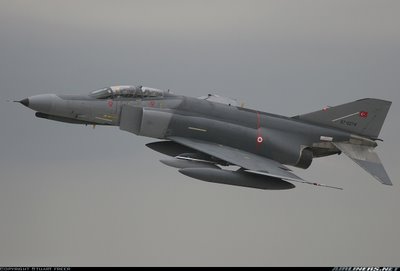
From a common history, on to a shared destiny





